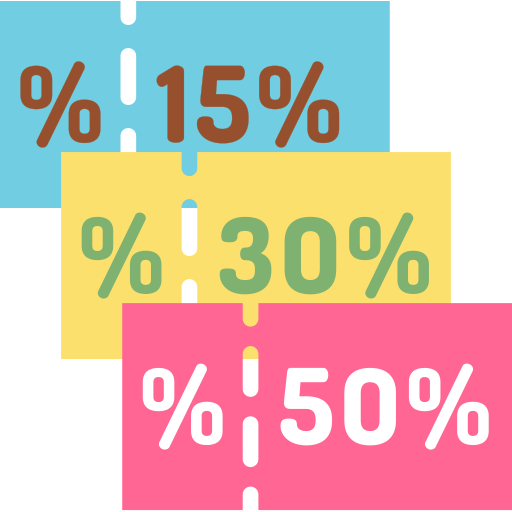
Looking for ways to learn German for free and wonder whether Duolingo’s free language learning app is effective? Find out how much German we could speak after 4 months of learning German on Duolingo for at least 30 minutes everyday (+60 hours).
Anyone who’s ever attempted to learn a language has probably tried Duolingo. It’s easily accessible, simple to use, has tons of language courses and most importantly, it’s free! This is why Duolingo has become one of the most popular language learning apps of all times. But is Duolingo actually good or effective for learning languages?
We personally tested this theory ourselves to find the answer! We tried to learn German on the Duolingo app for 4 months for at least 30 minutes everyday (i.e. 60+ hours) to find out how much German we could speak and understand when we arrived in Germany.
Find out how much German we managed to learn from an app after 4 months, the pros and cons of Duolingo, hidden features on the app that most people don’t know about, and whether it’s worth upgrading to Duolingo Plus.
Why We Started Learning German On Duolingo
You may have read from our last guide that we recently relocated to Berlin. We’ve been loving the change in environment and embracing all the new experiences of this dynamic city, including learning German.
Yes, we know what some of you are thinking… Berlin is probably the worst city to learn German in. The city has a huge expat community and most locals here can speak English. Nonetheless, we decided to learn the language anyway since Berlin has become our new home.
We started learning German on Duolingo for 4 months before arriving in Berlin. We completed lessons everyday for 4 months straight, for at least 30 minutes every single day.
Needless to say, we were expecting to understand and speak some sort of German when we arrived. But was that the case though? Continue reading if you’re curious whether our Duolingo experiment paid off.
Related Guide: Are you learning German on Duolingo in preparation for relocating to Germany? Find out 21 living in Berlin pros and cons before making the big move abroad.
Is It Difficult To Learn German as an English Native Speaker?
Learning a new language is exciting, but it can be intimidating as well, especially with a language like German. If you don’t believe us, google “funny German language memes” and you’ll find hours of laughs and giggles.

Initially, we thought it would be easy for us to pick up German since we both speak Afrikaans (an official language in South Africa that is derived from Dutch). Little did we know that German is far more complicated with its numerous grammatical cases, memorising which German nouns are masculine, feminine or neuter (most of which don’t make sense), and its peculiar sentence structure.
Now that we’ve come to terms with how tricky the German language can be, we’re glad we have gotten a head start with free language learning apps like Duolingo.
How To Use Duolingo To Learn German For Free
The wonderful thing about technology nowadays, is that you can literally learn anything anywhere with an internet connection (and some willpower). That’s how we were able to start learning German while travelling.
We were learning German on Duolingo for 4 months, for an average of 30 minutes every single day before arriving in Berlin. Yes, we completely geeked it out so we could test the theory on whether 34 hours of Duolingo equated to a first semester course for learning German.
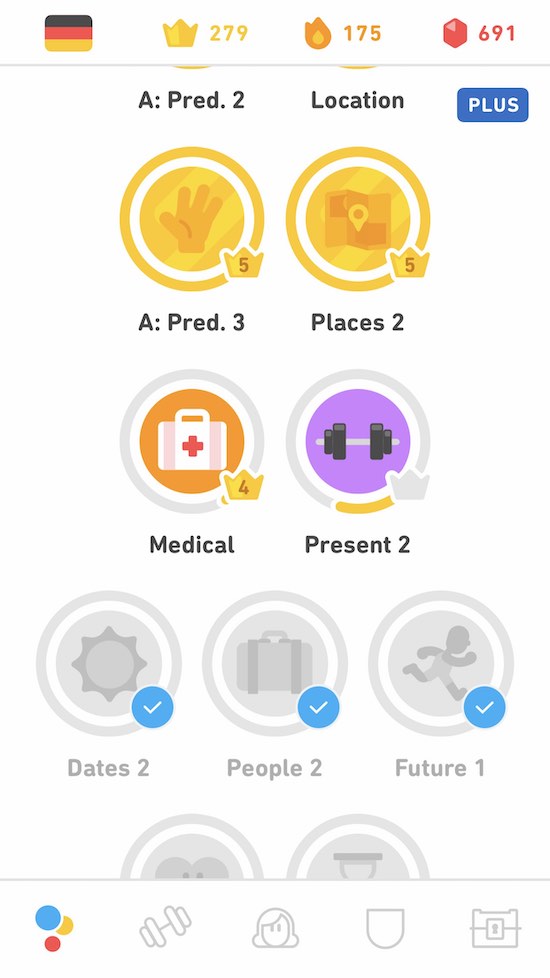
We calculated that in 4 months we probably spent 60+ hours learning German on Duolingo, which is just under double the time published in the claim.
We used the free subscription of Duolingo since it offered everything that we needed, but we also tried the 7 day free trial for Duolingo Plus to see what additional features the premium subscription offered.
Is Duolingo Good for Learning German?
How Much German Could We Speak and Understand After 4 Months of Duolingo
After geeking Duolingo for 4 months, we were super excited to come test our newly acquired skills in Berlin. We were quite thrilled when we could decipher some written signs and adverts we saw around the city.
However, when it came to listening to announcements on the train or an attempt at eavesdropping on the bus. We realised we couldn’t understand anything except for a few words here and there. We were able to ask short questions or order coffee at a restaurant or cafe, but could not understand when the person responded to us in German.
It was then that we realised that we knew a lot of vocabulary, but that we couldn’t string together a sentence or understand the German spoken language.
Related Guide: Looking for other free language apps to learn German? Read our Busuu review to find out how it’s different to Duolingo and whether it’s worth it.
German Language Schools in Berlin
As true adventurers, we didn’t give up of course. Instead, we did some research on German schools and decided to sign up for classes to see whether that would help improve our German.
Upon signing up, we had to do an online placement test to see which class we should start at. Michael was assigned to class A1.2 and I was assigned to class A2.1 (can’t beat an Asian).
That was when we realised that maybe Duolingo’s claim that 34 hours of learning a language on Duolingo equates to a semester course may be true to some extent.
Now that we’ve experienced both Duolingo and attending German language school, we are able to share the pros and cons of Duolingo’s free language learning app.
Save Me For Later
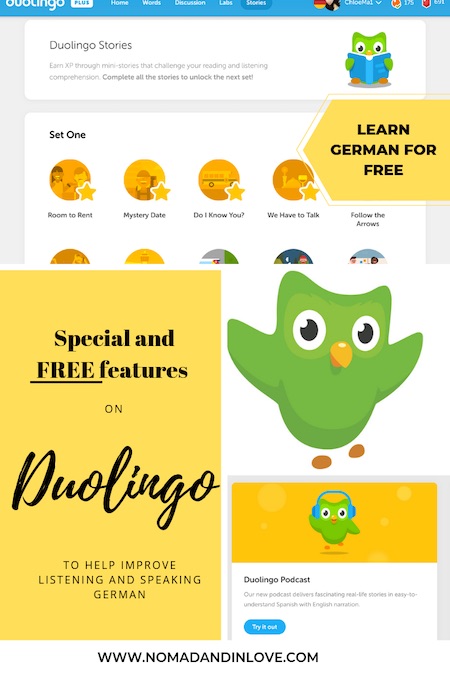
Pros of Learning German on Duolingo
- It’s free – this is probably the biggest benefit since German school could cost anywhere between €200 – €750 per month.
- You can learn anywhere and you determine your own pace.
- Great for learning vocabulary – this is especially important in German because you need to memorise what gender the noun is as it impacts what article you use before it. The gender of the noun doesn’t always make sense as nouns like skirt, wine, bikini, chair are considered masculine. Whereas pants, an orange, jeans and shoes are considered feminine. There is also a neuter gender but let’s not scare you anymore than we have.
- Gives you a head start before starting German school so that you are less overwhelmed at language school.
- Social aspect of competing with friends and family helps motivate you to practice everyday.
Cons of Learning German on Duolingo
- Pronouncing words may be a challenge since Duolingo doesn’t teach you how to pronounce the letters of the alphabet.
- Listening skills aren’t great especially for a language like German where the written and spoken language can be quite different.
- Some complex grammatical concepts like dative, prepositions, perfect and past tense can be a bit ambiguous and difficult to grasp on Duolingo alone.
- Duolingo’s syllabus does not follow the CEFR (the Common European Framework of Reference for Languages) level and therefore you won’t be able to get a formal certificate to say you have achieved a certain proficiency level in the language. This is of course not necessary if you’re learning for leisure (why would you do that to yourself?) but if you’re a non-German speaker looking for work in Berlin, Duolingo will not be sufficient.
- We found it very hard to put a sentence longer than 5 or 6 words together learning from Duolingo alone because the focus was more on vocabulary rather than grammatical rules and sentence structure.
Related Guide: Duolingo and Busuu are often considered the best language learning apps in their class. But is one better than the other? Find out in our Busuu vs Duolingo comparison guide.
FREE Hidden Features on Duolingo
Obviously being able to attend German language school would be ideal, but we personally understand that it’s a big investment and not everyone will be able to afford or have the time to attend classes.
We have therefore compiled a few tips and tricks you can use to help improve the Duolingo learning experience. You may not be aware of these features if you’ve only used Duolingo on your phone. So make sure to try Duolingo on your computer to access all the hidden special features below.
Duolingo Stories
Duolingo Stories has finally become a permanent feature that you can access directly from the app (and not just from their website). It use to be a Duolingo lab feature, which is experimental and could be discontinued at anytime. Now it’s permanent – YAY!
This is awesome because it’s probably the most useful tool on the Duolingo app that will help you improve your German listening and pronunciation skills.
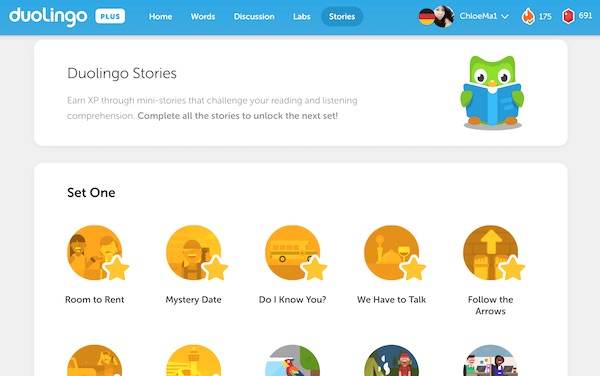
Basically you listen to a short story narration and answer some questions as you progress through the story. We love it because you can easily see the English translation by hovering over the word. It also helps bridge the gap between the written and spoken language. This is a great tool and the best part is that it’s FREE!
Grammatical Explanations on Duolingo
This is another hidden feature you can only access when using Duolingo on your desktop. You can access brief grammatical explanations on the topic by clicking on the subject and then selecting the light bulb icon. The explanations are brief, but it does help with understanding more complex grammatical concepts.
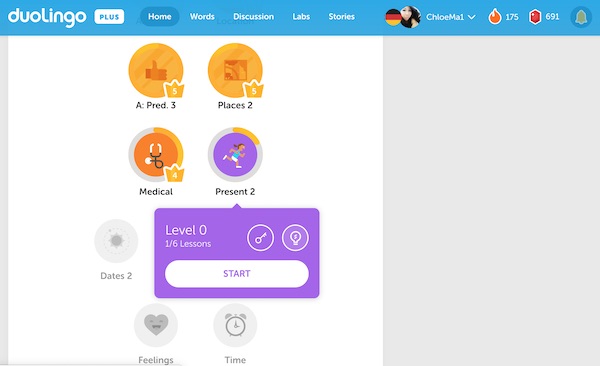
Duolingo Events
One thing we love about attending German language school is meeting lovely people from all over the world. You can do this on Duolingo too by signing up for one of the Duolingo Events. Availability depends on whether anyone is organising one in the city you’re in. We’ve been lucky enough to attend one and we had a blast! Didn’t learn much German, but we made some great friendships.
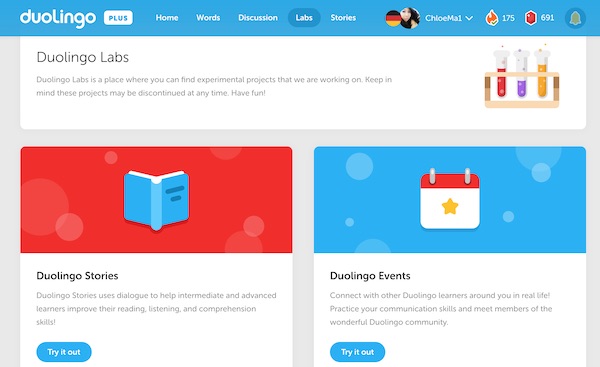
Skipping lessons on Duolingo
Repetition is great for memorising new vocabulary, but sometimes the topic is simply too easy and you just want to complete it and skip to the next subject. You can do this by clicking on the topic and then on the key icon. Duolingo will then give you a short test on the topic, and if you’re able to complete it with less than 3 mistakes then you can skip that level.
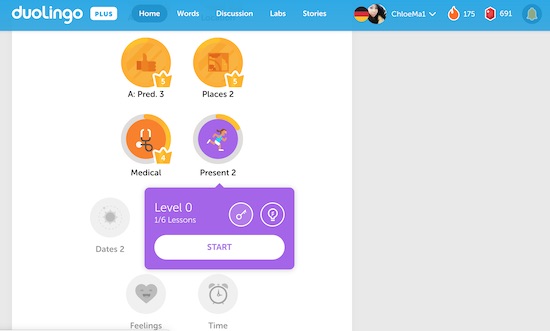
Is Duolingo Plus worth it?
In short, no. This is what makes Duolingo one of the best language apps for learning German (or any other language) because you don’t need to pay to access all the lessons. So far we haven’t found another language learning app of the same calibre, is free and allows you access to all of its learning content.
The only additional features you get on Duolingo Plus are:
- No ads
- You can do your lessons without an internet connection
- Complete a mastery quiz to see how much of the course you’ve completed
- Repair your monthly streak
- Skip as many lessons as you like
- Change your app icon to the Duolingo Plus icon
Besides that, the lessons are exactly the same. We love that this is in line with their mission to bring free education to millions.
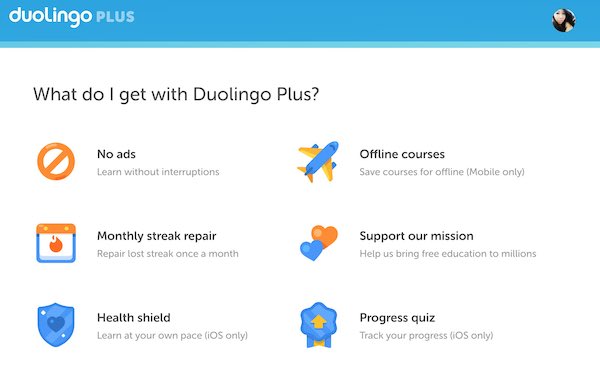
Duolingo vs Language School
We have continued learning German on Duolingo since our 4 month experiment and are now close to the 6 month mark. We’ve seen our progress dramatically improve since combining it with German language school and are now able to hold a basic conversation in German. We are very likely to continue both as we find it works best hand-in-hand.
The pandemic has definitely made it tricker to attend German language schools. But we’ve found a way around it by taking online German classes with Lingoda.
Find out how effective they are and what the pros and cons are in our detailed Lingoda review. Or read our Lingoda vs Duolingo and Busuu guide for an in-depth comparison.
Are you learning German in preparation for moving to Germany? If so, make sure you read our other useful Moving to Germany guides. We’ve included helpful guides like tips for renting a house or apartment in Germany and bike road rules you should know before cycling in Germany.

Is Duolingo Good For Language Learning
If you’ve done 4 months of Duolingo, the German course A1.1 will be quite easy, but A1.2 will be more challenging in comparison as you will start learning past tense and future tense at school, whereas Duolingo teaches you this much later.
If you’re finding German difficult to learn, don’t be discouraged. Even locals admit the language is tricky. Just keep going at it and eventually you’ll start getting a feel for the language. If all else fails and you need some German language humour, look up some of Mark Twain’s quotes on the German language. That should bring a smile to your face.
Or if you’re looking for other fun, creative and FREE ways to learn German (or any language), read our 22 ways to learn German online FREE. We’ve personally tried and tested all of them. Whether you’re looking for online German classes, other free language learning apps, the best YouTube channels and free podcasts to learn German, we’ve covered it all.
Have you tried to learn a language on Duolingo? We’d love to know your experience!
Moving to Germany: Free Resources
Are you planning to move to Germany? Need to open a German bank account that is in English while you work on your German? Then make sure to read our open a German bank account guide because you won’t need to register an anmeldung beforehand.
Need to still apply for your anmeldung? Don’t worry, we’ve got you covered. Find out how you can easily get your anmeldung with our simple 3 step guide. We’ve even translated the registration form for you from German to English in case your German isn’t up to scratch yet.
If you are planning to join us in Berlin and curious to know what monthly expenses to budget for to live in this incredibly vibrant city, read our Cost of Living in Berlin Guide.
And if you’re done with all your admin, take a break and go on a self cycling tour in Berlin. Follow the story of the Berlin Wall by bike and see most of the top historical attractions in our beautiful city.
Don’t have a bike? Don’t worry! We reveal the best and cheapest way to rent a bike in our Berlin Bike Sharing Ultimate Guide.

